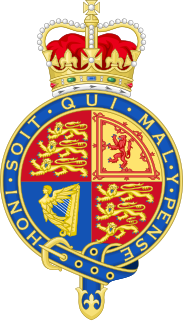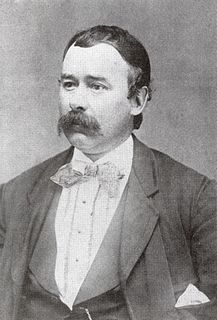
This section of the Timeline of Quebec history concerns the events relating to the province of Quebec, Canada between the enactment of the British North America Act and the end of the 19th century.

Shawn Michael Graham is a Canadian politician, who served as the 31st Premier of New Brunswick. He was elected leader of the New Brunswick Liberal Party in 2002 and became premier after his party captured a majority of seats in the 2006 election. After being elected, Graham initiated a number of changes to provincial policy especially in the areas of health care, education and energy. His party was defeated in the New Brunswick provincial election held September 27, 2010, and Graham resigned as Liberal leader on November 9, 2010.

The New Brunswick Liberal Association, more popularly known as the New Brunswick Liberal Party or Liberal Party of New Brunswick, is one of the two major provincial political parties in New Brunswick, Canada. The party descended from both the Confederation Party and the Anti-Confederation Party whose members split into left-wing and right-wing groups following the creation of Canada as a nation in 1867.

The City of Melbourne is a local government area in Victoria, Australia, located in the central city area of Melbourne. In 2016 the city has an area of 36 square kilometres (14 sq mi) and had a population of 135,959. The city's motto is "Vires acquirit eundo" which means "She gathers strength as she goes."
George Luther Hathaway was a politician in New Brunswick, Canada. His surname also appears as Hatheway.

The Canadian federal election of 1874 was held on January 22, 1874, to elect members of the House of Commons of Canada of the 3rd Parliament of Canada. Sir John A. Macdonald, who had recently been forced out of office as prime minister, and his Conservatives were defeated by the Liberal Party under their new leader Prime Minister Alexander Mackenzie.
A township, in the context of New Jersey local government, refers to one of five types and one of eleven forms of municipal government. As a political entity, a township in New Jersey is a full-fledged municipality, on par with any town, city, borough, or village. They collect property taxes and provide services such as maintaining roads, garbage collection, water, sewer, schools, police and fire protection. The Township form of local government is used by 27% of New Jersey municipalities; however, slightly over 50% of the state's population resides within them.

Maher v Town Council of Portland is a Canadian constitutional law court decision dealing with the constitutional guarantees for denominational schools set out in section 93 of the Constitution Act, 1867. The issue was whether the Common Schools Act, enacted by the Province of New Brunswick in 1871, infringed the guarantee of denominational schools set out in section 93(1).
The 13th New Brunswick general election was held on 20 June 1912, to elect 48 members to the 33rd New Brunswick Legislative Assembly, the governing house of the province of New Brunswick, Canada. The election was held before the adoption of party labels.
The 8th New Brunswick general election was held in October 1892, to elect 41 members to the 28th New Brunswick Legislative Assembly, the governing house of the province of New Brunswick, Canada. The election was held before the adoption of party labels.

New Brunswick has had, since the Legislative Council was abolished by an act passed on 16 April 1891, a unicameral legislature called the Legislative Assembly of New Brunswick with 49 seats. The legislature functions according to the Westminster system of government. Elections are now held at least every five years but may be called at any time by the lieutenant governor on consultation with the premier.

Lévite Thériault was a land owner and political figure in New Brunswick. He represented Victoria County from 1868 to 1874 and Madawaska County from 1874 to 1882 and from 1886 to 1894 in the Legislative Assembly of New Brunswick.

Robert Young was a businessman and political figure in Canada who was significant in the economic and political development of the city of Caraquet and in the province of New Brunswick.
The Common Schools Act of 1871 was legislation of the Canadian Province of New Brunswick, passed by the 22nd New Brunswick Legislative Assembly, which replaced the Parish Schools Act of 1858. The legislation aimed to abolish church-run schooling in New Brunswick and replace it with a system of government-run "common schools." The case of Maher v. Town Council of Portland was initiated as a result, and in the end, the Judicial Committee of the Privy Council upheld the Act. The act was stridently opposed by the Roman Catholic Church and its adherents, and a series of clashes between New Brunswick Catholics and the provincial government culminated in the shooting of two people following riots at Caraquet in 1875, after which the act was substantially amended to implement a joint religious/secular schooling system.
Local government in New Jersey is composed of counties and municipalities. Local jurisdictions are simpler in New Jersey than in other states because every square foot of the state is part of exactly one municipality; each of the 565 municipalities is in exactly one county; and each of the 21 counties has more than one municipality. New Jersey has no unincorporated areas, independent cities, or consolidated city-counties.
The People's Alliance of New Brunswick is a provincial political party registered in the Canadian province of New Brunswick. In the 2018 election, the party won 3 seats in the provincial legislature.

The Fixed-term Parliaments Act 2011 is an Act of the Parliament of the United Kingdom that received Royal Assent on 15 September 2011, introducing fixed-term elections to the Westminster parliament for the first time. Under the provisions of the Act, parliamentary general elections must be held every five years, beginning in 2015.
The fifth New Zealand Parliament was a term of the New Zealand Parliament.
The 23rd New Brunswick general election may refer to

The 40th New Brunswick general election is scheduled to take place on or before October 17, 2022. The October 17 date is the result of an amendment made to the Legislative Assembly Act in 2017, causing an election to be held every four years, on the third Monday in October, beginning after the planned September 22, 2018 election. However, due to the current minority situation in the legislature, an election could occur sooner.














